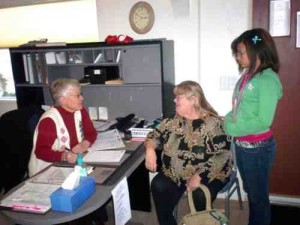Column by George Sibley
Education – February 2009 – Colorado Central Magazine
“The first duty imposed on those who now direct society is to educate the democracy.”
THAT WAS ALEXIS DE TOCQUEVILLE, author of Democracy in America, 170 years ago. But it is good advice today for “those who now direct society.” I would argue that we never have learned how to “educate the democracy” — which is why, for most of our history, we have lived in a plutocracy (government by, for and of the wealthy) imposed on a politically naive populace through fear and propaganda (“you can all be rich too” ).
The plutocracy probably never — even in the last half of the 19th century — ever got such a shameless stacking of the deck from the “directors of society” as it did these past eight years — and all of it from a directorate whose every other word was “democracy,” “freedom” or some other feel-good American buzzword, masking what was really going on.
Now we have elected a president who promises some “change” from that status quo. But the majority of his appointments, the people he is surrounding himself with, suggest that once more the old saying might hold true: “No matter who you vote for, the government always gets in.” I hope I am wrong — hope that our new president has surrounded himself with Sauls who have been blinded by new truths on the road to perdition and will wake up as Pauls zealous to undo their own pasts.
But my current thinking about “educating the democracy” is inspired by involvements closer to home, down on the ground in Central Colorado. I am heavily involved in public efforts in the Upper Gunnison valley to address the economic and environmental jaws of the vise closing down on us this century: the need to replace fossil fuels in our energy portfolio because a) they are going to run out in the not very distant future, and b) their emissions are impacting our climate.
We are keying our energy efforts in the Upper Gunnison to Governor Ritter’s “Colorado Climate Action Plan” (available on the web by googling that title). Basically, that means cutting carbon-dioxide-equivalent (CO2E) emissions by 20 percent by 2020, and 80 percent by 2050. The new president indicates that something like that timeline will probably — at last — become a national target.
It’s when I look at those numbers and try to think what they mean that I start thinking about the basic problem of “educating the democracy.” By 2020, most of the children who are now in middle school will either be finishing college or out in the world of work; some will be starting families and wanting good housing and convenient transportation. And by 2050, when the plan suggests the society needs to be virtually fossil-fuel free, today’s middle school children will be grandparents. If we are even remotely close on that 2050 goal, they and their children will have done the really hard work on a plan we are trying to write today — and they will be living in a society that we can barely imagine, in terms of its physical, economic and political infrastructures. What will it cost — not just in dollars, but in cultural expectations, personal and public losses and gains — to change from a cheap and easy energy base to … whatever it will be?
A hard fact that we are facing in the valley is the extent to which it is impossible — or maybe I should say futile — to try to plan with any specificity for such a major cultural change forty years down the road. The year 2020 is a reasonably imaginable horizon. We can assume that we have most of the technological and cultural tools we will need, and a 20 percent reduction seems to be within the technical and cultural scope of existing conservation and efficiency measures — although that is still going to require a major public education effort to get people to invest in significant energy-efficiency processes.
BUT 80 PERCENT REDUCTIONS? We are talking about major cultural change. Even if we could completely transition to renewables for our existing transportation and home energy supplies so that our lives would not seem to change very much outwardly, the new energy regime for such a massive economy would require levels of personal awareness and responsibility that have been, in the cultural sense at least, bred out of us by easy living. Some energy analysts say that the amount of heavy industrial activity necessary to manufacture the technological components for that kind of new-energy-but-same-culture transition, in that time frame, would so clog the atmosphere that a successful 80 percent reduction at the “consumption” end would barely balance out that industrial activity and would do nothing to resolve the climate situation (although it would free us from the finitude of fossil fuels).
Given the economic and environmental costs of that scenario, it’s likely that our children and grandchildren will be making some hard choices that will leave them with diminished material expectations, a loss that can only be compensated by enhanced opportunities in “non-material” areas of living — more active and engaging spiritual or community lives. This is not impossible, and it might even lead to more interesting and fulfilling lives — but it does require “educating the democracy” toward a different set of cultural goals and processes than are advanced by our current ubiquitous cultural indoctrination for consumption, competition and self-absorption.
So it begins to seem important, in trying to put together our state and local energy action plans, to think about what is going on in our cultural education, and how we can address what sounds like an impossible challenge. How can we educate our children and grandchildren to be more aware, more environmentally intelligent, more economically and socially collaborative, more materially efficient, and all around better citizens and earth inhabitants than we have been?
I THINK OF AN ANALOGY TO Moses, pointing the children toward a Promised Land he can’t enter. Then I realize how backward that is: we’re the ones who have inhabited a safe, sheltered, materially opulent Promised Land like the world has never seen, but we have pointed our children toward a future where there is less of just about everything we consider important; we took it for granted, as if it were ours by some divine right.
Meeting the challenge isn’t just figuring out how to do the transition; it is also figuring out how to make a materially reduced “life after shopping” worth living.
The question might arise: Why should I think it is necessary “to educate the democracy” in order to carry out this massive transition? Maybe we should in fact just leave it up to the technocrats (and the plutocrats who own them) to tell us what do. James Burke — best known for his television series, “Connections,” about the slapdash and serendipitous advance of science and technology — created a less known sci-fi video set in 2050 called “After the Warming.” He thought that the way to negotiate the transition from fossil fuels to renewables was through global submission to a “Planetary Management Authority,” a benevolent techno-directorate that ran what amounted to a massive and mandatory global cap-and-trade system for carbon emissions.
But I find myself wondering where we would find such an altruistic and benevolent directorate. Certainly not through existing global organizations like the World Trade Organization or International Monetary Fund, which are driven by plutocratic theology. The United Nations has its honest branches, but its governance tendons were cut at birth by the plutocrats.
At the end of this analysis, I always find myself back home, here in the valley. If we can’t figure it out here, and start getting it done, I don’t think it will ever get done. One valley of course has an infinitesimal impact on the global climate, but one has to hope that a lot of valleys will come to the same conclusion: Together, yes, we can.
But that requires educating the democracy about principles that we hear preached at us but have a hard time practicing in the midst of the barrage of diversionary propaganda and fearbombs the plutocracy keeps sticking in our faces.
And I rush to add that educating the democracy is more than just “improving the schools.” It means evaluating the whole process of cultural education — more of which is probably done today by media than by schools. For example, it is hard to imagine how we can seriously focus on a challenge like energy transition when most Americans are averaging 4-5 hours a day with a medium that preaches self-indulgence (“you deserve it” ), clever Seinfeldian nastiness and a grotesque sense of “reality.” It is no accident that all of our cultural education media with the possible exception of the public schools and aspects of the Internet are wholly owned and managed by, for and of the plutocracy (and they’ve got all the cool stuff).
So where do we start in educating the democracy — pulling ourselves up, as it were, by our children’s bootstraps? That, to me, is the really big challenge facing us as we try to face the future. Good morning, America.
George Sibley writes from Gunnison, which has been relatively clement so far this winter.

